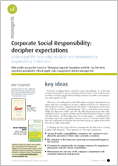Reinforce your company’s societal commitment

Companies have a strong impact when they place their firepower at the service of societal challenges. But this requires a new way of thinking and new competences. How can you deliver on your CSR commitment?
50 years ago, liberal economist Milton Friedman wrote: “The social responsibility of business is to increase its profits.” This affirmation may seem rather simplistic nowadays, as an increasing number of business leaders claim that companies benefit from engaging for the common good. Among them, Richard Branson, Virgin Group’s boss, defends a win/win vision of the relationship between business and society. His book Screw Business As Usual aims to demonstrate that the search for economic profits and societal commitment go hand in hand.
Numerous examples prove him right. Thus, in the midst of the Covid-19 pandemic, companies made available their production and human capacities to supply hydro-alcoholic gel, masks, respirators, etc. Others partnered with institutions and NGOs to address the emergencies of the situation, like Microsoft who collaborated with the UNICEF to propose a distant learning platform for confined children. Beyond their positive impact for society, such partnerships have enabled companies to reinforce their staff engagement and corporate image.
Is this just a temporary solidarity drive or the acceleration of a deeper-rooted trend? Numerous clues speak for the second hypothesis. Nowadays, employees and consumers, as well as investors, express growing expectations in terms of companies’ corporate social and environmental responsibility. They also scrutinize the entire value chain: What customers does the company have? Is it sufficiently watchful of its subcontractors? Does it ensure it limits the negative impacts of its activities on local communities and the planet?
Yet, if many companies are today ready to commit, moving into action is filled with obstacles. Indeed, addressing environmental or social issues often requires intervention at several levels, in coordination with several stakeholders: governments, NGOs, local authorities, partners, etc. Not only might their objectives differ, but sometimes their vision as well, or the working approaches, timescales, etc. It is then indispensable for companies to evolve their culture and competences.
SubscriberSign in
to download
the synopse (8 p.)
VisitorI want to buy
this synopsis (8 p.)
VisitorI want
to subscribe
See also

Evolving towards circular economy
“Extract – produce – dispose”: against this linear economic model, nowadays reaching its limits, a new model is emerging. Circular, it aims at minimizing, regenerating and recycling the resources. Why and how to initiate this transition?

Combine economic and social performance
In the current economic crisis, social responsibility or environmental performance issues are often relegated to the background. How can businesses turn CSR into a source of strategic innovation and creation of economic value?
